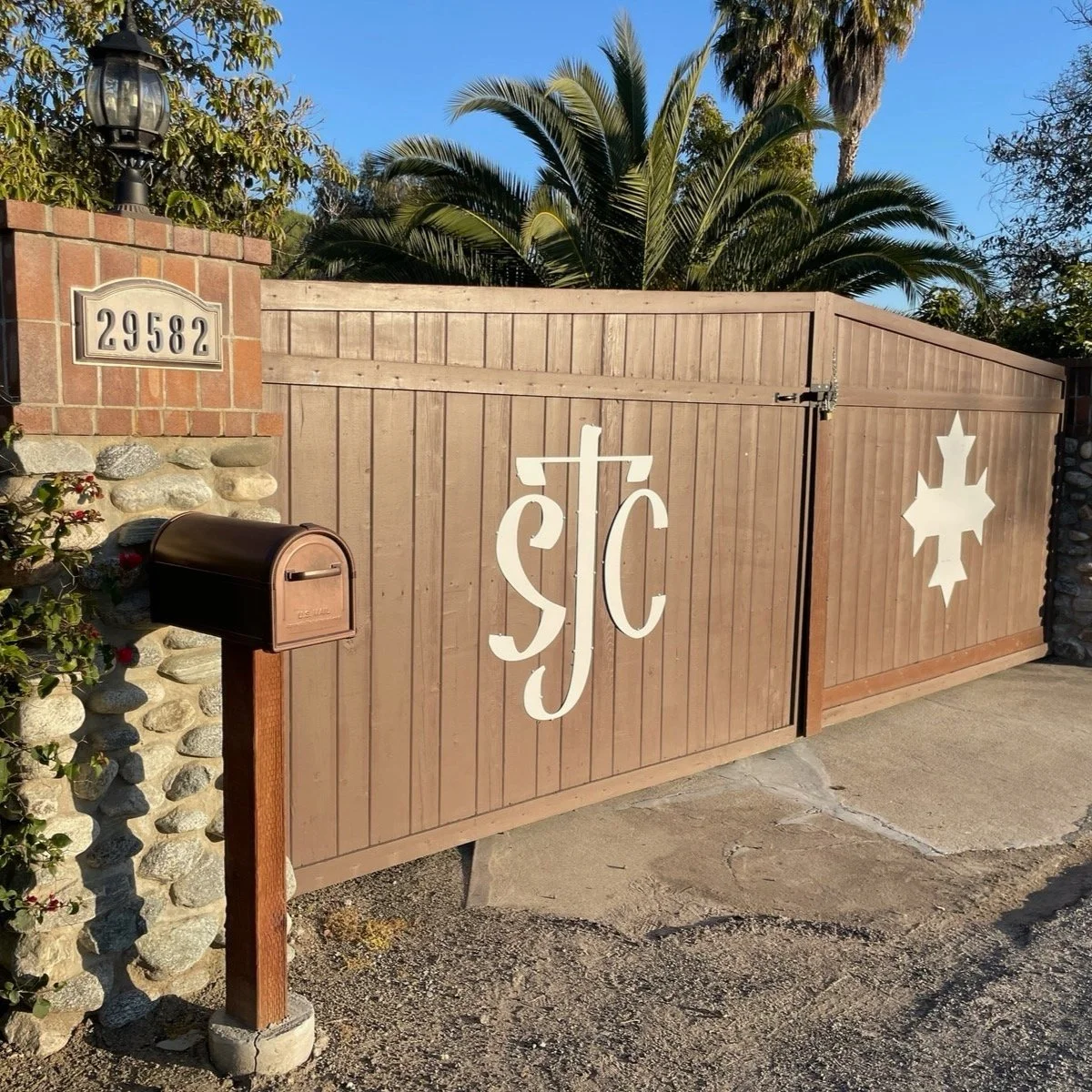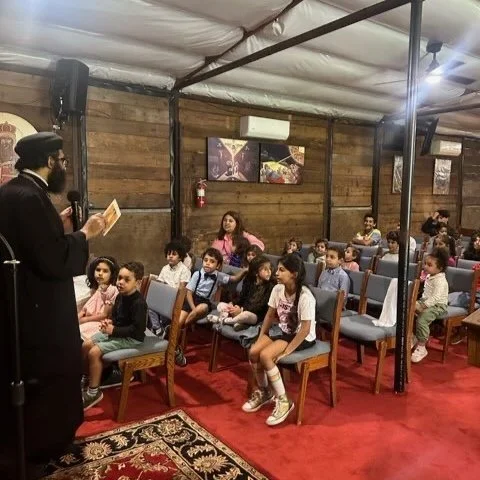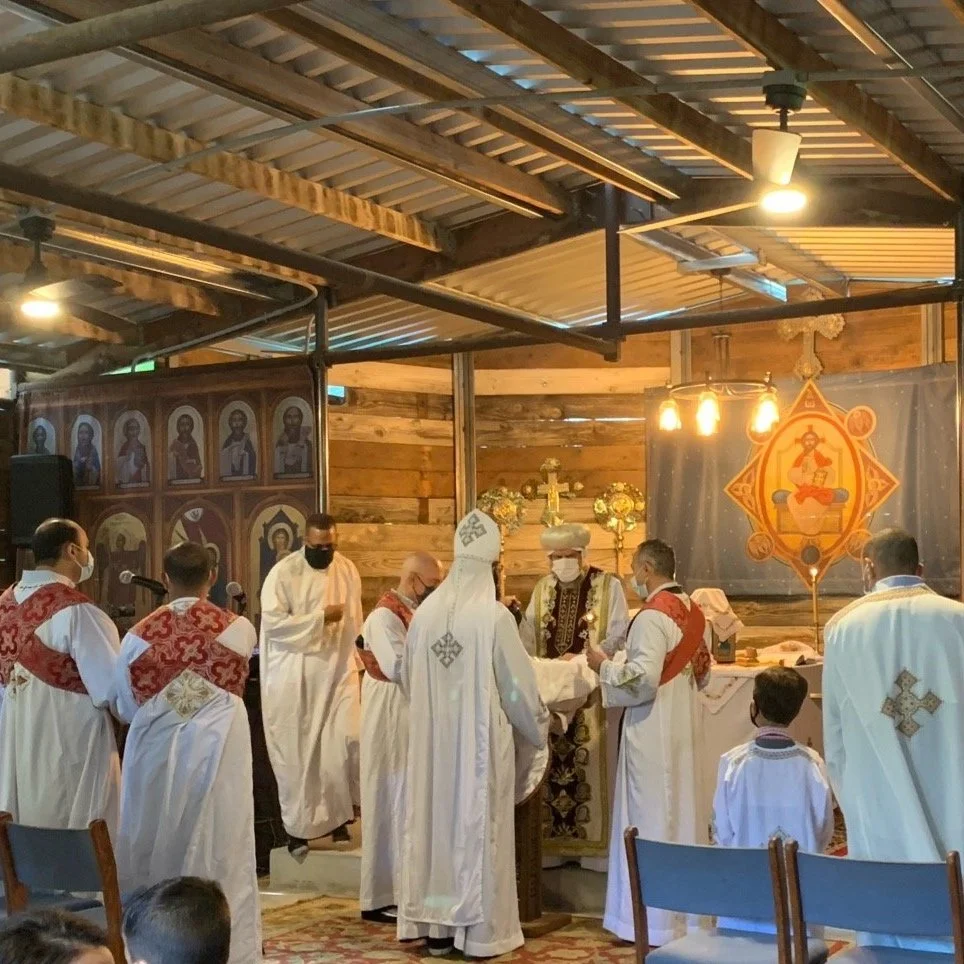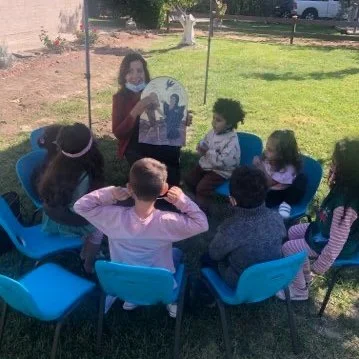Welcome to SJC - We’re Happy to Have You!
A Letter from our Priest.
We welcome you with great joy and love to St. John Chrysostom American Coptic Orthodox Church.
Our mission, is to educate the mind, deepen the heart, and train the hands, through fellowship, discipleship, worship, service, and witness. Together we work to elevate ourselves, our families, and our communities to be like Christ.
Our parish seeks to eliminate any dominance of any one culture in order to create an open environment for Americans of different ethnic and cultural heritages, mixed marriages within the Coptic community, and later generations of Coptic adults who wish to live their Orthodox faith in America without cultural barriers.
On behalf of the parishioners of SJC, we invite you to come and experience the love and warmth of our Church and parish.
Please feel free to explore our grounds - we're excited to have you! Should you have any questions or would like to schedule a private visitation, please contact us via this form or emailing info@stjohnoc.org.
With love in Christ,
Fr. Daniel Habib
What is the Coptic Orthodox Church?
-
It is one of the most ancient Churches in the world, having been founded by Saint Mark the Apostle, the writer of the second gospel, in the first Century. The word ‘Coptic’ comes from the ancient Egyptian word ‘hekaptah’ meaning ‘Egypt’, and thus ‘Coptic’ merely means ‘Egyptian.’ As a conservative Church, the Coptic Church has carefully preserved the Orthodox Christian Faith in its earliest and purest form, handing it down from generation to generation, unaltered and true to the Apostolic doctrines and patterns of worship.
-
She believes in the Holy Trinity: Father, Son and Holy Spirit (being one God); and that our Lord, God and Savior Jesus Christ, the true Son of God, became incarnate, was born of the Virgin Saint Mary, died for us on the Cross that He may grant us Salvation, rose on the third day that He may grant us everlasting life with Him, and ascended to heaven after forty days, sending the Holy Spirit to His disciples as He promised them, on the day of Pentecost.
-
One of the pillars of her faith is the teachings of the early Church Fathers as well as the Nicene-Constantinopolitan Creed as a statement of Her Faith.
-
Her main point of reference is the Holy Scripture, as depicted in literal translations such as King James (KJV), New King James (NJKV), and the Revised Standard Version (RSV). Although the Coptic Orthodox Church accepts any New Testament translation that is faithful to the Greek Textus Receptus translation, She prefers only the Septuagint (LXX) translation of the Old Testament and not the Masoretic text found in most Bibles today.
-
She has seven primary Mysteries: Baptism, Chrismation, Confession, the Eucharist (Communion), Marriage, Priesthood, and the Anointing of the Sick.
-
She does not change basic matters of Faith, Dogma or Tradition to suit current trends (this does not mean however that matters such as language and day-to day practices are not changed to suit conditions of ministry and the needs of the congregation). Holding on to such matters of Faith and practice has not been an easy task, as the Coptic Church has always lived persecution of one form or another since its establishment in the first century.
-
She was founded by Saint Mark the Apostle and Evangelist who preached to the Egyptians around 60-70 A.D.
Come and See.
-
Yes, absolutely. We are a community made up of both cradle-born Orthodox Christians and those who have converted to the faith. We are very comfortable with newcomers, inquirers, and visitors. Anyone who wishes to discover ancient Coptic Orthodox Christianity is welcome. If you have questions, the parish priest will be happy to answer them. So don’t be afraid to ask questions about what we do and why.
When you enter a church, someone will greet you and direct you to a place to sit. We have books of our Divine Liturgy in English, Coptic, and Arabic to everyone. In addition, we have a large Powerpoint presentation that updates continuously during the Liturgy with the prayers. You may follow the service text, or, if you prefer, simply close your eyes and enter into the Church’s beautiful worship of God.
Following the Sunday Divine Liturgy, you are invited to join us for a “coffee hour” which is a good time to get to know our parish members and meet our priest.
-
The general rule for men and women is to dress appropriately, modestly and respectfully, as before the living God.
-
Each parent is responsible to take care of their child. We encourage children to be present in Church for the services. This participation is part of a child’s spiritual formation. However, if your baby or child gets fussy, talkative, or has a melt-down, please take him or her out of the nave until he or she is ready to return quietly.
-
The traditional posture for prayer and worship in the Orthodox Church is to stand, as before the King of the universe! In many churches in Egypt, there are typically no pews in the churches. Chairs or benches on the side walls are usually reserved for the elderly and infirm. In America, we build our churches with pews or chairs, so you may sit. However, it is appropriate to stand during the Gospel reading, the Anaphora through the Institution Narrative, the distribution of the Holy Mystery, when the priest gives a blessing, and at the Dismissal.
-
Orthodox priests may only serve the Holy Eucharist to baptized members in good standing of the canonical Orthodox Church, who have recently confessed, and fasted before partaking of the Holy Eucharist. This is the ancient tradition of the Holy Church for the 2,000 years of its history. The Orthodox Church understands the Holy Eucharist as a mystery of the real presence of Christ in the Eucharist, not simply as a memorial, or merely in a spiritual sense, as many other non-Orthodox Christians do. Rather than trying to accommodate to often varying “interpretations” or revisions of this and other doctrines of the ancient faith, we simply ask that you respect the ancient, apostolic tradition and join us in receiving the Eulogia (blessed bread), at the end of the Divine Liturgy.
-
Between 65–75% of the traditional Coptic Liturgy involves congregational singing. Coptic Christians do not use musical instruments with the exception of the cymbals and triangle, which are used simply to keep musical time. A choir of deacons leads the congregation in harmonious chant, usually in Coptic and English. Our hymns are solemn, prayerful and intended to lead the faithful to worship the living God.
-
On Saturday evenings, the Evening Raising of Incense service (Vespers) is generally 30–45 minutes in length, including a short homily in English. On Sunday mornings, a similar service is celebrated before the Divine Liturgy. Afterwards, the Divine Liturgy is approximately 3 hours in length with an English homily. We understand this may seem like a very long service, but we know that when you have participated in an Orthodox service you will feel like you have truly worshipped the living God.
-
Yes, beginning September 9, Sunday School will be held on Saturdays from 6-7 pm, followed by Vespers and Midnight Praises. We provide Sunday school in small groups for children in grades K through 8, as well as meetings for youth in high school.
Recommended Reading.
Clendenin, Daniel B. (1994), Eastern Orthodox Christianity. A Western Perspective.
Ware, Timothy (1963), The Orthodox Church.
Schaeffer, Frank (1994), Dancing Alone: The Quest for Orthodox Faith in the Age of False Religions.
Chrysostom, St. John (1984), On the Priesthood.
Carlton, Clark (1997), The Faith: An Orthodox Catechism.
Vlachos, Metropolitan Hierotheos, Entering the Orthodox Church.
Schmemann, Fr. Alexander (1998), For the Life of the World.
Colliander, Tito (1985), The Way of the Ascetics.
Carlton, Clark (1997, 1999), The Way and The Truth.
Ware, Bishop Kallistos (1998), The Orthodox Way.









